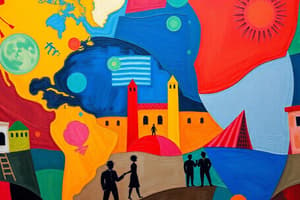Podcast
Questions and Answers
History is primarily the study of past ______, particularly in human affairs.
History is primarily the study of past ______, particularly in human affairs.
events
Political History emphasizes political events, leaders, and ______.
Political History emphasizes political events, leaders, and ______.
institutions
Prehistory refers to the time before written ______.
Prehistory refers to the time before written ______.
records
Military History analyses wars, battles, and military ______.
Military History analyses wars, battles, and military ______.
Primary sources are firsthand accounts such as ______ and official documents.
Primary sources are firsthand accounts such as ______ and official documents.
Edward Gibbon is noted for his work on the decline of the Roman ______.
Edward Gibbon is noted for his work on the decline of the Roman ______.
Cultural History explores arts, traditions, and intellectual ______.
Cultural History explores arts, traditions, and intellectual ______.
Revisionist history seeks to re-evaluate established ______.
Revisionist history seeks to re-evaluate established ______.
Flashcards are hidden until you start studying
Study Notes
What is History?
- Study of past events, particularly in human affairs.
- Utilizes a range of sources including documents, oral accounts, and archaeological finds.
Importance of History
- Provides context for current events.
- Helps understand societal changes and human behavior.
- Offers lessons from past successes and failures.
Branches of History
- Political History: Focuses on political events, leaders, and institutions.
- Social History: Examines societal structures and cultural norms.
- Economic History: Studies economic systems and their development.
- Military History: Analyses wars, battles, and military strategies.
- Cultural History: Explores arts, traditions, and intellectual movements.
Key Historical Periods
- Prehistory: Time before written records, including the Stone Age.
- Ancient History: Civilization emergence (e.g., Mesopotamia, Egypt, Greece, Rome).
- Medieval History: Feudalism, the rise of empires, and the Middle Ages.
- Modern History: Enlightenment, industrialization, and contemporary events (19th century onwards).
Researching History
- Use primary sources (e.g., letters, official documents) for firsthand accounts.
- Secondary sources (e.g., textbooks, analyses) provide interpretations of primary data.
- Consider bias and perspective in historical accounts.
Historical Methodology
- Define a problem or question.
- Gather evidence from various sources.
- Analyze and interpret the evidence.
- Present findings while acknowledging limitations and biases.
Key Historians and Theorists
- Herodotus: Often called the "Father of History"; emphasized narrative.
- Thucydides: Focused on factual reporting and political realism.
- Edward Gibbon: Noted for his work on the decline of the Roman Empire.
- Marc Bloch: Pioneered social history and interdisciplinary approaches.
Challenges in History
- Interpretation of sources can vary widely.
- Revisionist history seeks to re-evaluate established narratives.
- The impact of cultural and temporal context on historical events.
Historical Impact on Society
- Shapes national identities and collective memory.
- Influences education, policy-making, and cultural heritage.
- Encourages critical thinking and informed citizenship.
What is History?
- Examines past events, primarily in human affairs.
- Relies on various sources, including written documents, oral accounts, and archaeological findings.
Importance of History
- Provides context for understanding current events.
- Helps to understand societal changes and human behavior.
- Offers insights from past successes and failures.
Branches of History
- Political History: Concentrates on political events, leaders, and institutions.
- Social History: Analyzes societal structures and cultural norms.
- Economic History: Investigates economic systems and their development.
- Military History: Explores wars, battles, and military strategies.
- Cultural History: Focuses on arts, traditions, and intellectual movements.
Key Historical Periods
- Prehistory: The time before written records, including the Stone Age.
- Ancient History: The emergence of civilizations, such as Mesopotamia, Egypt, Greece, and Rome.
- Medieval History: Characterized by feudalism, the rise of empires, and the Middle Ages.
- Modern History: Marked by the Enlightenment, industrialization, and contemporary events (from the 19th century onwards).
Researching History
- Primary sources: Offer firsthand accounts, like letters and official documents.
- Secondary sources: Provide interpretations of primary data, such as textbooks and analyses.
- Recognizing bias and perspective when interpreting historical accounts is crucial.
Historical Methodology
- Involves defining a problem or research question.
- Gathering evidence from diverse sources.
- Analyzing and understanding the evidence.
- Presenting findings, acknowledging limitations and biases.
Key Historians and Theorists
- Herodotus: Known as the "Father of History", his focus was on narratives.
- Thucydides: Emphasized factual reporting and political realism in his writings.
- Edward Gibbon: Noted for his work on the decline of the Roman Empire.
- Marc Bloch: Pioneered social history and interdisciplinary approaches.
Challenges in History
- Interpretation of sources can be subjective and vary widely.
- Revisionist history seeks to re-evaluate established historical narratives.
- The impact of cultural and temporal context on historical events can be complex.
Historical Impact on Society
- Shapes national identities and collective memory.
- Influences education, policy-making, and cultural heritage.
- Encourages critical thinking and informed citizenship.
Studying That Suits You
Use AI to generate personalized quizzes and flashcards to suit your learning preferences.




